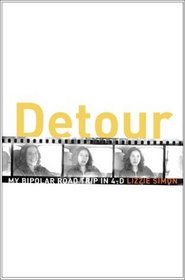Helpful Score: 2
This book definitely gave me some insight into what it is like for people to have bipolar. I did want more from the story...but I am not quite sure what it was the book was missing.
Overall, I was left feeling very happy for Lizzy Simon.
Overall, I was left feeling very happy for Lizzy Simon.
Lizzie Simon, a diagnosed bipolar, decides to take leave from her job and drive around the country looking for her "herd," people like her, who, because of a defining moment, were diagnosed manic depressive, but, despite the difficulties, were successful and living life to the fullest. What she discovered was that people with bipolar are complex and at times, very hard to define and that success sometimes is just being able to wake up and say "Hey, I'm alive." A quick, powerful read. Highly recommended.
Interesting first- person account! I felt like I was a bug on her wall witnessing and hearing life as she experienced it. Conversational style writing. Quick read!
The chapters are short, but don't let that fool you.
It's the stigma of mental illness she addresses that makes this book great. Stigma is one of things even the best writers do not bring up in the conversation. Yet it soaks mental illness to the point even mental health care professionals will belittle their clients, saying they are not trying hard enough. The guy on the street sees a poster saying mental illness is being helped because the stigma is dying out, and he writes, who are these people? All we know is they have guns. And they are killers!
Simon comes from a dream life, read: privileged, but the best thing it gives her is school in Paris instead of America, and she runs through Columbia University, and gets a producers job even before she graduates. But always that question, tell?, yes? no?
Is it a myth that society no longer cares if you jump up on the top of the filing cabinet while talking to your doctor, just to be higher up, like a cat?
It's no myth, it's still there, breathing its horrible breath down in the basement. Simon finds this out when she interviews successful young people on her Detour, all over the US, and finds every one of them keep their bipolar illness to themselves. Don't ask, don't tell.
And always the Med question. Another, yes? no? Hospitals, yes? no?
It's a great book, but even after Simon goes from one end of the US to other, The. Stigma. Is. Still. There.
It's the stigma of mental illness she addresses that makes this book great. Stigma is one of things even the best writers do not bring up in the conversation. Yet it soaks mental illness to the point even mental health care professionals will belittle their clients, saying they are not trying hard enough. The guy on the street sees a poster saying mental illness is being helped because the stigma is dying out, and he writes, who are these people? All we know is they have guns. And they are killers!
Simon comes from a dream life, read: privileged, but the best thing it gives her is school in Paris instead of America, and she runs through Columbia University, and gets a producers job even before she graduates. But always that question, tell?, yes? no?
Is it a myth that society no longer cares if you jump up on the top of the filing cabinet while talking to your doctor, just to be higher up, like a cat?
It's no myth, it's still there, breathing its horrible breath down in the basement. Simon finds this out when she interviews successful young people on her Detour, all over the US, and finds every one of them keep their bipolar illness to themselves. Don't ask, don't tell.
And always the Med question. Another, yes? no? Hospitals, yes? no?
It's a great book, but even after Simon goes from one end of the US to other, The. Stigma. Is. Still. There.




